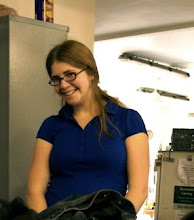Jewish holidays in Israel are always special. There's something about celebrating a holiday that is usually a minority holiday, but to do it surrounded by others who are also celebrating. Chanukah in Jerusalem was no exception. Pardes was on vacation for the week, and I stayed in Jerusalem, taking the opportunity to wander around the city (and eat LOTS of sufganiyot). One night I went with some other friends from school to see the hanukkiyah lighting at the Kotel. Chanukah means rededication in Hebrew, referring to the rededication of the Temple after the Greeks trashed it and used it for idolatry. Despite my conflicted feelings about the Kotel, it was exciting to celebrate Chanukah there, where it actually happened. After, we wandered through the Jewish Quarter of the Old City to see the hanukkiyot, which are often displayed in windows or even outside of homes in the twisting alleys of the Rova, in fulfillment of the mitzvah of publicizing the Chanukah miracle. The atmosphere was something akin to going to the neighborhood with the best Christmas lights and decoration. There were tour guides leading secular Israeli families through the neighborhood, explaining the customs.
lots of hanukkiyot in the Old City
Even so, I was missing Christmas, and there was always the reminder in the back of my head that Chanukah was not the only winter holiday being celebrated here. There were small reminders - plastic Christmas trees on sale at the Tel Aviv Central Bus Station, a story on Israeli radio during evening hour about Jews writing Christmas songs. So on Thursday afternoon, following the theme of celebrating winter holidays where they actually happened, I traveled with (a very large group of Jews) to Bethlehem for Christmas. Sara's roommate Katie was playing clarinet at a mass at the Lutheran Christmas Church. The mass was mostly in English, with a good chunk of Arabic, including a children's choir singing in Arabic. The mass was really beautiful, and felt universal and familiar even though it wasn't my prayers, my music, or even entirely in my language. One part of the service in particular really spoke to me, the "prayers of intercession." The prayers were read in 8 different languages, and were incredibly universal (except for the Jesus references).
(English)
Almighty God, long ago you made this holy night shine with the brightness of your true light. We thank you for gathering us in this holy city of Bethlehem. We pray now for deepened faith. We pray for Peace and Justice for God's people in every place. By your Holy Spirit, lead us beyond the manger to serve as your peacemakers in this land and throughout the world.
(Arabic)
For all those in Palestine and Israel - those who have been here for generations, those who have more recently arrived and those who are visiting as pilgrims. Open hearts and minds to see your grace that brings hope, healing, and opportunity to all people.
(Burmese)
For all those who are imprisoned - by walls, wars, and public policies that humiliate and discourage. We pray for those enduring a long wait for freedom. Especially we remember those you will not forget - political prisoners and refugees.
(English)
For all those who live in abundance - that they might know the joy of simplicity and sharing. Grant us peace that only you can give. Give us what we need - despite what we think we want.
(German)
We pray for the leaders in government, especially those who serve in Palestine and Israel. Inspire them to uphold the truth, lift the yoke of oppression, and work for justice for all your people. Grant dignity to all women and men, boys and girls.
(Finnish)
We pray for those whose voices are stilled - victims of violence, neglect or abuse. Bring hope to those torn from their homes and land. Give voice so all people of the world can hear, care and advocate for those who are suffering.
(Swedish)
For the newborn, the elderly, the sick, and all who depend on the care of others - especially those whose names we lift in the silence...That they may find places of nurture, and be comforted by the birth of the Christ child.
(Japanese)
For all those who look to this holy but troubled land, grant the full revelation of Jesus, our Savior, who brings hope and salvation, and makes us one.
Trusting in your mercy, O Saving God, we commend to you all for whom we pray, through the one born among us, Jesus Christ our Lord. Amen.
the inside of Lutheran Christmas Church
singing Silent Night with candles
After the service, we walked to dinner, detouring through the craziness that was Manger Square. Bethlehem was (not surprisingly) CROWDED. Tons of traffic, tons of people, tons of PA security. At first I was uncomfortable with the amount of armed security (they were very present and visible), but it was really the same amount that there would be for any large public event of that scale in Jerusalem. Even so, this region of the world really likes its guns and military.
Manger Square
Dinner was salatim and pita - definitely not traditional Christmas dinner, for neither the Jews nor the Christians in our group. But it was definitely delicious, and around 10pm, the lights of the restaurant dimmed, and SANTA CAME! It was interesting to see that Santa is the same in Bethlehem, despite the fact that his suit is definitely not meant for the Middle East in December (today's high was 74 degrees...).
It's really easy to get caught up in Jerusalem's challenges as a Jewish city, what that means, how it plays out, how the city can be home to a plurality of Jews. But this city, and this land, is holy and special to those of many different religions.









No comments:
Post a Comment